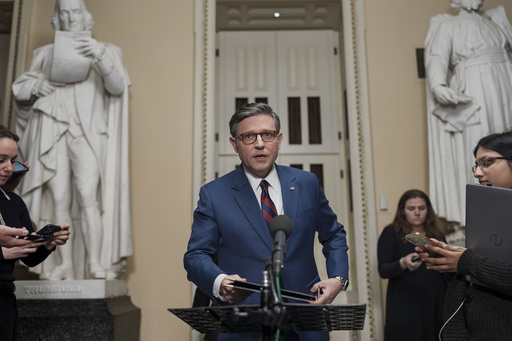
House Speaker Mike Johnson is pushing forward with a new strategy to avert a potential government shutdown, which is set to occur at midnight on Friday. His proposal aims to provide temporary funding for federal operations and disaster aid while deferring President-elect Donald Trump’s call for a debt ceiling increase until the new year. The House faced challenges on Thursday when Trump’s funding plan was dismissed, as both Democrats and numerous Republicans expressed their discontent with his abrupt demands.
In related developments, Elon Musk, a prominent supporter of Trump, played a significant role in undermining a bipartisan spending bill that could have averted the shutdown. By disseminating misleading information via over 100 posts on X, Musk leveraged his influence as the platform’s owner to sway congressional opinion, revealing a potential trend for his future involvement in political matters. Political experts, like John Mark Hansen from the University of Chicago, noted that Musk’s actions might represent a shift in the balance of power, with Trump now having to contend with Musk’s growing presence in politics.
As the House prepares for its evening vote on the new funding plan, the details surrounding this proposal remain unclear. Johnson has mentioned that it will maintain government funding at current levels until March, with an allocation of $100 billion for disaster relief and $10 billion designated for agricultural support. The uncertainty surrounds how effective the House can be amid the looming threat of a government shutdown.
Republican senators, however, have expressed cautious optimism about their House counterparts’ ability to pass a funding bill. Senator John Thune estimated that if the House swiftly organized, they could finalize matters by the end of the day. Senator John Cornyn underscored the urgency of the situation, stressing that Republicans should be ready to accept whatever the House can deliver due to the holiday season approaching and the repeated nature of contemplating these issues within three months.
In his final speech as the Senate Republican leader, Mitch McConnell hinted that the party could face negative repercussions if they fail to enable the government to remain operational. He reminded fellow Republicans that shutting down the government could lead to a backlash, implying that such actions could be politically detrimental. McConnell will continue to serve in the Senate after stepping down, allowing leaders like Thune to take over in January when Republicans regain the majority.
Despite these developments, House Speaker Mike Johnson has faced substantial scrutiny within his party. Some Republican lawmakers, including Thomas Massie, have voiced their intent to oppose Johnson for the speaker position next year, criticizing his reliance on Democratic support to push through the funding proposal. The forthcoming months suggest Johnson may need to navigate carefully as he can only afford to lose a few GOP votes.
While announcing that House Republicans have come together for a spending agreement, Johnson refrained from divulging specifics, emphasizing unity among the party members. He reassured that they would not allow a government shutdown, pledging to fulfill obligations for federal employees and aid for disaster victims.
Meanwhile, House Majority Leader Steve Scalise indicated that discussions still occurred regarding a budget deal, but suggested a decision would emerge soon. Scalise also hinted that they were evaluating the potential involvement of the debt ceiling in future discussions.
As legislative efforts unfold, the administration’s stance on the matter remained clear. White House Press Secretary Karine Jean-Pierre articulated that it is not President Biden’s responsibility to rectify the situation, insisting that Republicans must address the crisis they created. She maintained that dialogue between Biden and congressional leaders continues, with hopes that a shutdown can still be averted.
House Republicans convened for internal discussions on how to proceed, with options considered for a temporary funding bill, disaster aid, and farmers’ support potentially being voted on separately. Senate Majority Leader Chuck Schumer urged Johnson to revert to a previously agreed-upon deal with Democrats, arguing that this route would ensure the government remains operational.
Trump, on the other hand, has maintained pressure on leaders regarding the debt ceiling increase, stating that if his demands are not met, the government should shut down. This stance highlights the tension between his expectations and the realities faced by Republicans who fear the backlash of a shutdown.
In summary, as deadline negotiations intensify leading up to the predicted government shutdown, the challenges within Republican ranks become increasingly evident. The complexity of maintaining a unified front while managing contrasting demands from influential party figures like Trump and Musk presents a formidable challenge for Johnson’s leadership moving forward. As discussions continue, the potential fallout from a shutdown is on stark display, with implications that could resonate deeply within upcoming political landscapes.
